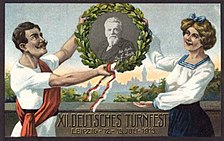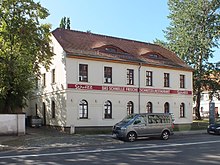Ferdinand Goetz
Ferdinand Hermann Wilhelm Goetz (born May 24, 1826 in Leipzig ; † October 13, 1915 there ) was a doctor, chairman of the board of the German gymnastics association and a member of the North German Reichstag and the German Reichstag (directly elected in 1887 and 1890) for the National Liberal Party .
Life
On May 24, 1826, Ferdinand Goetz was born as the eighth child of the Nuremberg City Wage Director and Saxon Chief Customs Inspector Friedrich Wilhelm Goetz and his wife Elfriede, née. Oppermann, born in Leipzig.
After graduating from the Thomas School in Leipzig , Goetz began studying medicine at the University of Leipzig in 1846 and in the same year joined the Kochei Leipzig fraternity and later the Wartburg Leipzig fraternity .
For his later life, the gymnastics and fencing lessons with Heusinger and Berndt, the fencing master at the Thomas School, were groundbreaking. On a Whitsun trip in 1847 he met the “gymnastics father” Friedrich Ludwig Jahn (1778–1852) in Freyburg an der Unstrut , which was a significant event for his life.
He was expelled from Leipzig in 1848 as a participant in pre-revolutionary events of 1848. In the Dresden May Uprising of 1849 Goetz was primarily involved in caring for the wounded, which is why he was only punished with pre-trial detention. Still, he had to accept disabilities in completing his medical degree. He was also in prison several times .
Goetz received his doctorate in 1850 and began his professional career as a personal physician and general practitioner in Geithain in 1851 . In 1853 he married Minna Dornblüth (1828-1917), who came from Plau am See in Mecklenburg . Her father, Ludwig Dornblüth (1784–1857), was also a doctor.
In 1855 Goetz returned to Leipzig and took over a practice in today's “ Goetz House ” in Lindenau , which his brother, the lawyer Heinrich Goetz, bought and left to him and his family. Of his five children, the sons Paul, as a railway engineer and director of the Leipzig tram company, and Walter (1867–1958) as a historian of the Renaissance and the Reformation , gained greater importance.
In the following 60 years Goetz worked as a general practitioner and went down in the local history of Lindenau as the “Lindenau potty doctor”, as he was also called. During his doctor's home visits, he also looked into the saucepans to find clues about possible causes of the disease. That was mainly about cholera .
In the village he was the head of the fire brigade and in 1860 suggested the establishment of the men's gymnastics club in Lindenau . Until Lindenau was incorporated into the city of Leipzig, he was a member of the municipal council of the rural community of Lindenau.
Goetz was a member of the North German Reichstag since 1867 and the German Reichstag. He was directly elected in 1867, 1887 and 1890.
In 1858 he took over the editorial office of the Deutsche Turnzeitung . Together with his friend, the entrepreneur Karl Heine (1819–1888), he was the founder and initiator of numerous civic and social associations in Leipzig. With Hugo Rühl (1845–1922), he published the German Gymnastics Association's handbook in 1879 . Rühl, in turn, dedicated a biography to him.
Goetz was essential to the organization of the XII. Participated in the German gymnastics festival in Leipzig in 1913 with more than 60,000 participants and gave the speech at the age of eighty-seven.
Ferdinand Goetz died on October 13, 1915 in his home. He is buried in the Leipzig-Lindenau cemetery. On the war memorial stone at the Leipzig South Cemetery , which the German Gymnastics Association dedicated, can be read at the bottom of the left panel: “Ferd. Goetz Chairman of the German Gymnastics Association, Ehrengau representative † October 13, 1915 ”.
Importance for gymnastics
After "gymnastics father" Friedrich Ludwig Jahn , Goetz is the outstanding personality of the German gymnastics movement of the 19th century. The meeting with Jahn was very important for him. Its essential importance lies in the formation of the German gymnastics movement. Together with Theodor Georgii (1826-1892) he founded the German Gymnastics Association in 1868 as a merger of gymnastics clubs in Germany. It became the world's largest gymnastics organization at the time. Goetz first became honorary managing director and from 1895 until his death as chairman of the board.
Goetz was especially admired in the last years of his life, sometimes referred to as “gymnastics father” and named together with Friedrich Ludwig Jahn.
The house on Lützner Strasse developed into the center of business life for the German Gymnastics Association and a meeting place. The archive of the German Gymnastics Association set up by Goetz in 1867, later the library, was managed and looked after in Lindenau for many years. The building has great historical and ideal value for the German gymnastics and sports movement. The cultural and historical value for Leipzig may also be mentioned here, because it is one of the few houses from the Biedermeier period that have been preserved. In 2001 it was saved from the threat of demolition.
Goetz was considered one of the harshest critics of workers' sport , which he denied the necessary moral and national maturity. However, in the "Völkische Turnfehde" he spoke out vehemently against the prohibition of Jews in gymnastics associations, as he feared that the same would be split up, which could result from the establishment of competing associations. His opposition to anti-Semitic tendencies, on the other hand, stamped him a “friend of the Jews” among the radical right, which he definitely was not.
Goetz was critical of the idea of the Olympic Games. He called for a boycott of the first modern Olympic Games on the grounds that “only infidelity to the fatherland and a vain thirst for fame” could induce one to take part in the “Olympic Games that were incompatible with German honor”.
Goetz was the godfather of Willi Daume (1913–1996), born on May 24, 1913 , who later became the NOK President of the Federal Republic of Germany.
In the period after the Second World War , Goetz was forgotten in his homeland. It was only after the collapse of the GDR that it came back into public awareness.
Memberships and honors
Ferdinand Goetz was a member of the Leipzig Freemason Lodge Minerva zu den drei Palmen and an honorary member of his son Walter's student union, the Munichia Munich gymnastics club (today Munichia Bayreuth gymnastics club).
In 1859 he became a member of the old gentry of the Leipzig fraternity Germania and in 1887 an honorary member of the fraternity Normannia Leipzig .
During his lifetime in 1896, on the occasion of his 70th birthday in Lindenau, a street near his home was named after him.
On the occasion of his 100th birthday in May 1926, the German Gymnastics Association inaugurated him a memorial created by the Leipzig sculptor Carl Seffner , which is still in the garden of the Goetz House property.
The city granted him honorary citizenship for the establishment of the Jahn memorial in Freyburg an der Unstrut .
There are streets named after Goetz in the Frankfurt district of Fechenheim and in the Berlin district of Tempelhof , but here as Götzstraße.
In honor of Ferdinand Goetz, the German Gymnastics Association has been calling for a “Turnfahrtentag” every year since 1921 on Ascension Day, which quickly became a “Götzwanderung” for gymnasts. Some gymnastics clubs still maintain this sociable tradition today. The most important utensil on the hike used to be the club pennant attached to a spear, which the children proudly carried forward to the group.
literature
- Helge Dvorak: Biographical Lexicon of the German Burschenschaft. Volume I: Politicians. Sub-Volume 2: F-H. Winter, Heidelberg 1999, ISBN 3-8253-0809-X , pp. 154-156.
- Hugo Ruehl: Ferdinand Goetz: A German gymnast life. Leipzig 1921.
- Otto Vogt: Goetz, Ferdinand Hermann Wilhelm. In: New German Biography (NDB). Volume 6, Duncker & Humblot, Berlin 1964, ISBN 3-428-00187-7 , p. 581 f. ( Digitized version ).
- Siegfried Hoyer : doctor - "gymnastics father" - democrat. For Ferdinand Goetz's 175th birthday. In: City history. 2, 2001, p. 54 f.
- Eerke U. Hamer : Dr. Goetz as a member of the North German and German Reichstag (1867–1870 and 1887–1893): dedicated to Prof. Dr. Arnd Krüger on his 65th birthday (July 1, 2009); (originally intended for the Festschrift by Dr. Swantje Scharenberg and apl. Prof. Dr. Dr. Bernd Wedemeyer as ed.). Leipzig: Self-published by EU Hamer, 2009. 41 pp.
Web links
- Goetz, Ferdinand NW in the database of members of the Reichstag
- Biography of Ferdinand Goetz . In: Heinrich Best : database of the members of the Reichstag of the Empire 1867/71 to 1918 (Biorab - Kaiserreich)
Individual evidence
- ^ Wilhelm Friedrich Goetz. In: Masonic Wiki. Retrieved October 8, 2017 .
- ↑ Richard Sachse, Karl Ramshorn, Reinhart Herz: The teachers of the Thomasschule in Leipzig 1832-1912. The high school graduates of the Thomas School in Leipzig 1845–1912. BG Teubner Verlag, Leipzig 1912, p. 18.
- ↑ Olympic Games 1896: Glory instead of shame spiegel.de April 6, 2016
- ↑ Gina Klank, Gernoth Griebsch: Encyclopedia Leipziger street names . Ed .: City Archives Leipzig. 1st edition. Verlag im Wissenschaftszentrum Leipzig, Leipzig 1995, ISBN 3-930433-09-5 , p. 85 .
- ↑ The sociable club hike. (No longer available online.) TV “Palatia” Hatzenbühl, archived from the original on December 15, 2017 ; accessed on January 26, 2018 . Info: The archive link was inserted automatically and has not yet been checked. Please check the original and archive link according to the instructions and then remove this notice.
| personal data | |
|---|---|
| SURNAME | Goetz, Ferdinand |
| ALTERNATIVE NAMES | Goetz, Ferdinand Hermann Wilhelm (full name) |
| BRIEF DESCRIPTION | German physician and politician (NLP), MdR, sports functionary |
| DATE OF BIRTH | May 24, 1826 |
| PLACE OF BIRTH | Leipzig |
| DATE OF DEATH | October 13, 1915 |
| Place of death | Leipzig |








